Recently, it seems like “mental health” is being talked about more and more. This is great, and the results are palpable — this year, the Anxiety and Depression Association of American found college-aged adults (age 18–25) have more accepting views of mental health care than other adults. A majority of college-aged adults view seeing a mental health professional as a sign of strength.
But when we talk about mental illness, we’re talking about a whole range of conditions and communities that face a whole range of needs. So now that we’ve all established mental health as something we should talk about, where do we go from there? And more important, what do we do?
To get the conversation started, we asked our Mighty community to tell us one thing about mental illness they feel still isn’t being addressed.
Let’s talk about it:
1. “Mental illness is not only what’s portrayed in the media. Obsessive compulsive disorder is not just being organized and washing your hands a lot. It’s hard to choose just one thing to highlight because so much of mental illness is never talked about and what is talked about is often portrayed in a very stigmatizing way.”
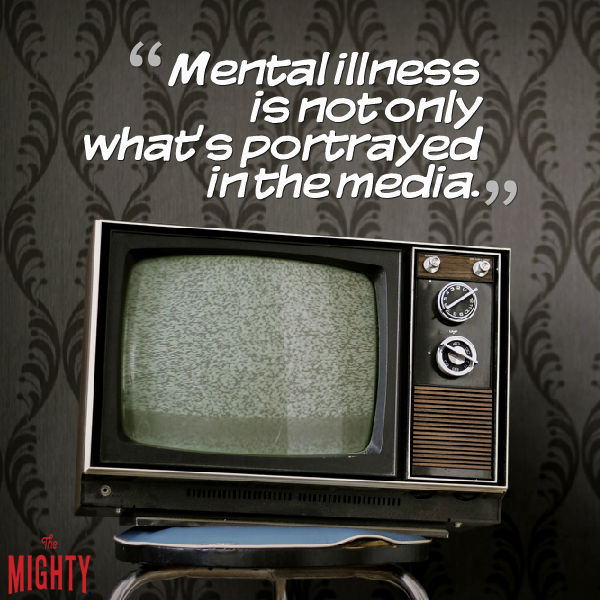
2. “There’s a positive side to the illnesses. They totally suck, but my depression gave me empathy, my anxiety got me to be more organized, being suicidal taught me how to appreciate every moment I almost didn’t have.”
3. “The fact that mental illness can be debilitating. To the point of not being able to work.”
4. “Strength… mental illness is not a weakness.”
5. “No one ever talks about urges to hurt oneself or suicidal thoughts. If you try to bring it up, others push it away.”
6. “The guilt. For letting people down, for being such a burden and annoyance, for not being productive… the list is never-ending and overwhelming. The guilt is a constant for me.”
7. “No one wants to talk about how unrelenting it can be. How simple tasks can feel like climbing a mountain.”
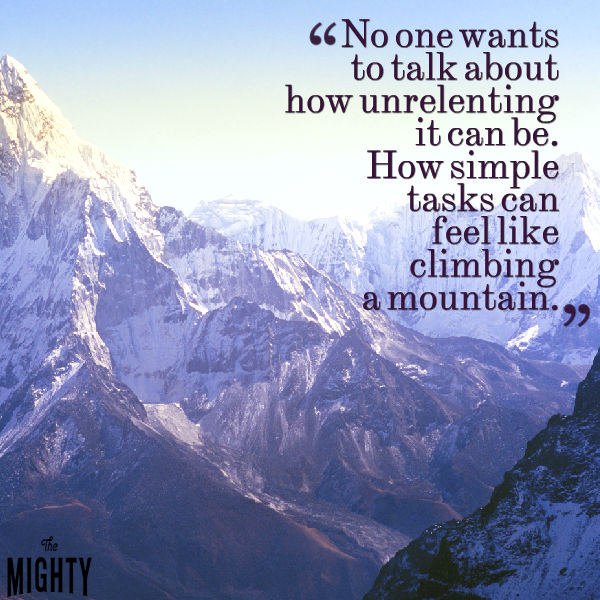
8. “Many people don’t talk about the physical toll it can take on someone’s body. Anxiety makes me nauseous, and depression gives me headaches.”
9. “The fact that there might not be a cause or ‘trigger.’ When I have a drop in health everyone wants to know what caused it. Few people want to consider it as something that just happens, in the same way one’s physical health can ‘drop.’”
10. “You never hear about the fact that there isn’t a break. People who have mental illness and their loved ones are always in one of two states: either working through a low point or trying to arrange their lives to minimize the trauma of the next impending one.”
11. “No one ever talks about the sociopolitical oppression that people with mental illness experience. People with mental illness face discrimination, micro-aggressions, abuse — everything other non-privileged minority groups experience. There is rarely a dialogue about mental illness oppression, which is one of the most harmful things to a person with mental illness.”
12. “No one wants to talk about the intrusive thoughts due to the shame and fear. We need to talk about them so we don’t keep them bottled up.”
13. “How broken the mental health system is. How poorly people with mental illness are treated in places like the ER when they are in a crisis. How people with severe mental illness are viewed as ‘frequent flyers’ who just want attention when they really need help.”
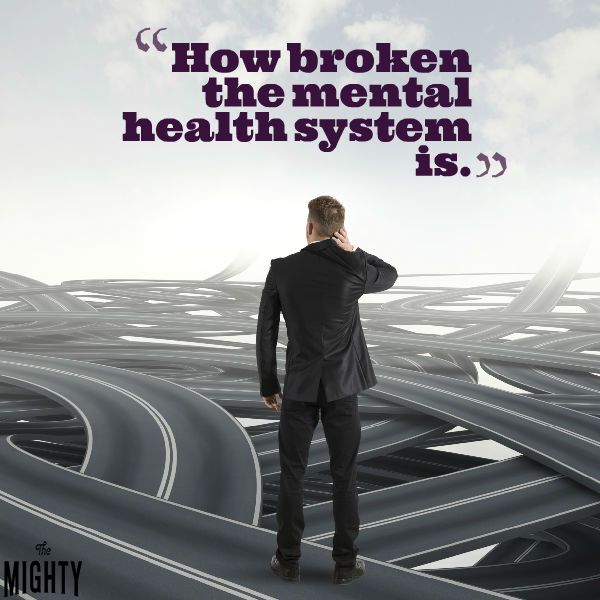
14. “There’s this expectation that your mental health should be sacrificed to meet the duties and demands of everyday life. I feel it the most in higher education. I go to a school that only trains psychologists, yet we have no counseling center and even the professors admit we are pushed to and beyond our limit.”
15. “The loneliness.”
16. “I think people don’t talk about self-injury enough. And people don’t understand the reasons for it. It’s not always about suicide or wanting to hurt yourself.”
17. “For some people it doesn’t get better or easier. I’ve lived with depression and anxiety for 20 or so years, and it actually has gotten harder. I know it’s important to promote positivity with depression, but for people like me it just provokes frustration. Mental illness isn’t a one size fits all.”
18. “I feel like no one ever wants to talk about steps to recovery… It’s like taking a test without ever learning the material.”
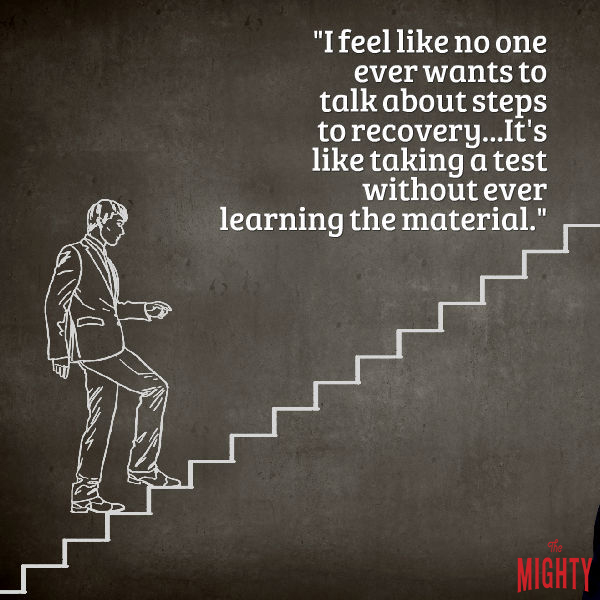
19. “No one talks about how much you have to sacrifice to be normal. Everyone thinks I have it all together, but it’s only because I work so hard at maintaining my mental health. I have to stick to a routine so strict, it’s like I’m an adult who has to manage a child, but the child is inside me.”
20. “What hospitalization is really like.”
21. “Rarely do I hear of read about the lack of resources and qualified mental health professionals. How difficult it is to find a psychiatrist or therapist. No one seems to talk about just how expensive treatment can be. Treatment is being recommended in the media, I’m told help is out there, but it’s taking a lot of energy to find — energy I don’t have.”
22. “Mental illness is more than depression or anxiety. It can mean loss of social networks, loss of income and loss of respect from your peers. Most of all, it means not being sure of what you can accomplish.”
23. “Knowing you need help, but also knowing you can’t afford it.”
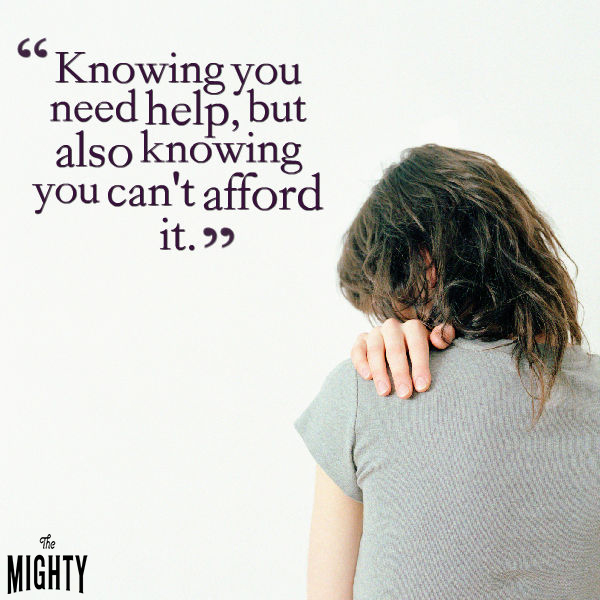
24. “I feel like no one talks about the suicidal thoughts. A lot of people have them. I have them. It doesn’t always mean I need to be hospitalized or we need to call an ambulance — but I do wish I could talk about it. It’s so taboo. You can have ideation without having a plan. It’s part of depression. And we need to talk about it.”
25. “I feel like no one really talks about what it’s like living with someone who has a serious mental illness. I feel like it’s taboo to talk about how scary it is when a relative becomes violent during a mental health crisis.”
26. “The treatment disparity. Not everyone with mental illness has access to the proper treatment. Good therapists and psychiatrists are hard to find. As more and more therapists move towards self-pay and not accepting insurance, more and more people can’t access the care they need. Without treatment, good quality treatment, living with a mental illness can be even harder.”
27. “People with mental illness can still function — hold steady jobs, care for children or loved ones, develop meaningful relationships, have hobbies and passions — all while still battling a very real and serious fight. They aren’t automatically unreliable, unstable or incapable of accomplishing things just because they have mental illness.”
28. “How isolating it can be — not only for the person with mental illness but for the entire family.”
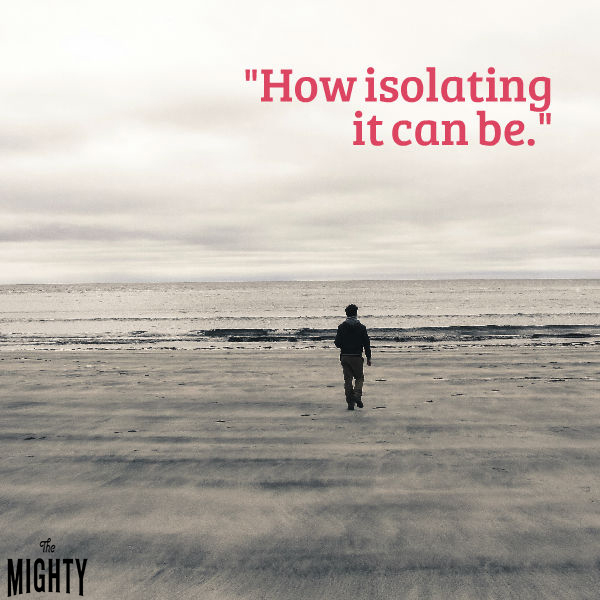
29. “That doctors will sometimes blame other symptoms on mental illness and not take you seriously. I was diagnosed with multiple sclerosis only after I pushed back and said it wasn’t anxiety related to bipolar — something was wrong. And hell, I was right.”
30. “How it impacts your sex life.”
31. “How to help a person with no insight into their condition.”
32. “Nobody talks about the fact that mental illness is just like any other chronic physical diagnosis. It can be managed, there will be episodes and there will be good days, but it never goes away.”
33. “The part where it exists.”

*Answers have been edited and shortened.
